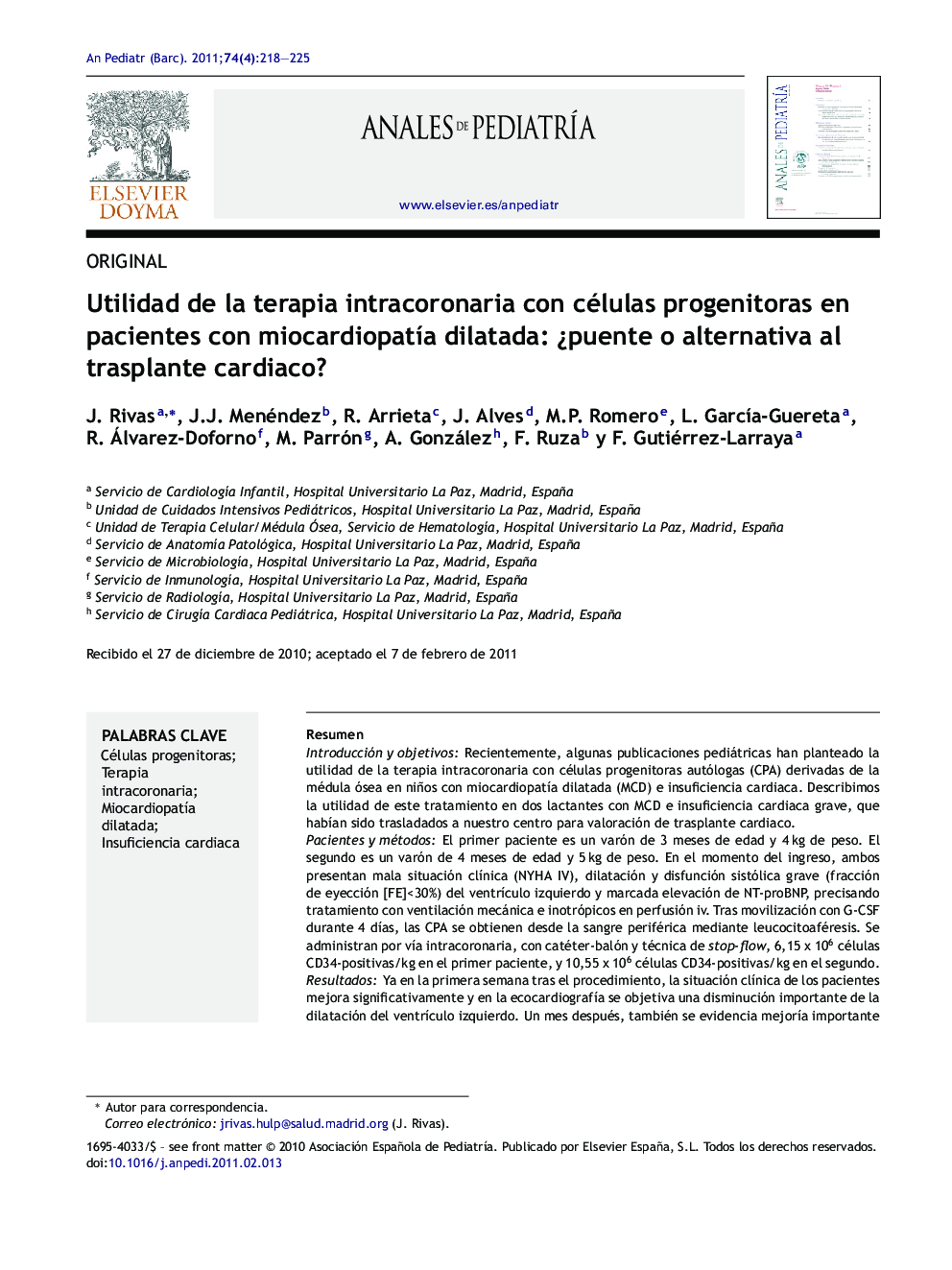| Article ID | Journal | Published Year | Pages | File Type |
|---|---|---|---|---|
| 4142282 | Anales de Pediatría | 2011 | 8 Pages |
ResumenIntroducción y objetivosRecientemente, algunas publicaciones pediátricas han planteado la utilidad de la terapia intracoronaria con células progenitoras autólogas (CPA) derivadas de la médula ósea en niños con miocardiopatía dilatada (MCD) e insuficiencia cardiaca. Describimos la utilidad de este tratamiento en dos lactantes con MCD e insuficiencia cardiaca grave, que habían sido trasladados a nuestro centro para valoración de trasplante cardiaco.Pacientes y métodosEl primer paciente es un varón de 3 meses de edad y 4 kg de peso. El segundo es un varón de 4 meses de edad y 5 kg de peso. En el momento del ingreso, ambos presentan mala situación clínica (NYHA IV), dilatación y disfunción sistólica grave (fracción de eyección [FE]<30%) del ventrículo izquierdo y marcada elevación de NT-proBNP, precisando tratamiento con ventilación mecánica e inotrópicos en perfusión iv. Tras movilización con G-CSF durante 4 días, las CPA se obtienen desde la sangre periférica mediante leucocitoaféresis. Se administran por vía intracoronaria, con catéter-balón y técnica de stop-flow, 6,15 x 106 células CD34-positivas/kg en el primer paciente, y 10,55 x 106 células CD34-positivas/kg en el segundo.ResultadosYa en la primera semana tras el procedimiento, la situación clínica de los pacientes mejora significativamente y en la ecocardiografía se objetiva una disminución importante de la dilatación del ventrículo izquierdo. Un mes después, también se evidencia mejoría importante en la FE (>40%) y de los niveles de NT-proBNP, que se mantiene en el tiempo posteriormente. No obstante, en el primer paciente, a los cuatro meses del tratamiento, el ventrículo izquierdo se dilata de nuevo y empeora discretamente su función, aunque sin existir repercusión clínica significativa.ConclusionesLa terapia intracoronaria con CPA puede suponer una alternativa terapéutica en niños, especialmente de corta edad, con MCD y fallo cardiaco, pudiendo disminuir la mortalidad en lista, mejorar su situación clínica y ofrecer mayor tiempo de espera para recibir un órgano idóneo o, incluso, hacer innecesario el trasplante.
Introduction and objectivesSome paediatric publications have recently raised the value of intracoronary therapy with autologous bone marrow-derived progenitor cells (APCs) in children with dilated cardiomyopathy (DCM) and heart failure. We describe the usefulness of this treatment in two infants with severe DCM and heart failure, who had been transferred to our hospital for cardiac transplant evaluation.Patients and methodsThe first patient was a 3 months old male weighing 4 kg. The second was a 4 months old male weighing 5 kg. At the time of admission, both were in poor clinical condition (NYHA IV), with severe dilation and systolic dysfunction (ejection fraction [EF]<30%) of the left ventricle and marked elevation of NT-proBNP, requiring treatment with mechanical ventilation and inotropic iv infusion. After mobilization with G-CSF for 4 days, APCs were obtained from peripheral blood by leukocytapheresis, administering them by a slow intracoronary bolus injection using a stop-flow technique (6.15x106 CD34-positive cells/Kg in the first patient, and 10.55x106 CD34-positive cells/Kg in the second).ResultsSince the first week after the procedure, clinical status of patients improved and echocardiography showed a decrease in left ventricular dilation. A month later, there was a significant improvement in EF (> 40%) and NT-proBNP levels, subsequently maintained throughout the follow-up. However, four months later in the first patient, the left ventricle dilated again and its function slightly worsened, but without any significant impact in his clinical status.ConclusionsIntracoronary therapy with APCs can be an alternative in children, especially infants, with DCM and heart failure. It can reduce the waiting list mortality, improve clinical status and provide more time on the waiting list to receive a suitable organ, or even to make transplantation unnecessary.
